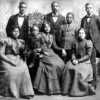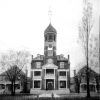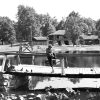calsfoundation@cals.org
Bennie Fuller (1951–)
Bennie Fuller became the all-time leading scorer in Arkansas boys’ high school basketball history and was ranked fourth on the national scoring list. Fuller scored 4,896 points at the Arkansas School for the Deaf in Little Rock (Pulaski County) from 1968 to 1971. In 1971, Fuller scored 102 points in a game against Leola (Grant County). Fuller became third nationally on the per-game scoring average list (50.9 points per game during the 1970–71 season).
Bennie Fuller was born on March 13, 1951, the son of Tammy Fuller, who worked at the Pine Bluff Arsenal, and Birdie Missouri Fuller. Fuller grew up near Hensley (Pulaski County), where he learned to shoot a basketball into a hoop made from a bicycle wheel. By his senior season in high school, college coaches were filling the stands at the School for the Deaf to watch the Class B team play. Fuller’s 102 points on January 19, 1971, against Leola are the most points ever scored by a deaf high school player in a certified varsity game.
“I didn’t know I had 22 points in the first quarter and 44 points at halftime,” Fuller said in an interview years later through a sign-language interpreter. “I wasn’t counting. At the end, I had no idea I had scored 38 points in the fourth quarter. It was like a machine gun, one after another. It was just nuts. I had some big nights before. If I had to guess that night, I would have thought around 70. But they showed me the scorebook. It was incredible.”
Fuller, who had been named the most valuable player in the Arkansas high school All-Star basketball game in 1971 at Barton Coliseum in Little Rock, is also believed to be the first deaf player to receive a college basketball scholarship at a hearing institution. After campus visits to the University of Arkansas (UA) in Fayetteville (Washington County), the University of Texas at El Paso, and the University of Memphis, Fuller chose to attend Pensacola Junior College in Florida.
Fuller chose Pensacola when the school also offered a scholarship to Donnie Nutt, the nephew of Houston Nutt Sr., the coach at the School for the Deaf. No other school could offer Fuller a personal interpreter, a role Donnie Nutt, who understood sign language, could play. Pensacola Junior College also offered a vocational trade course in technical typesetting that interested Fuller. Fuller averaged more than thirty points per game in 1971–72, and Nutt averaged more than twenty points per game, even though Pensacola only went 7–18 that season. Jim Atkinson was replaced as head coach at the end of the season, and Fuller and Nutt found their roles reduced the next season as the Pirates went 26–4.
Fuller received an associate’s degree after two years. He transferred to the University of Arkansas at Pine Bluff (UAPB), where he played for the Golden Lions. After receiving a bachelor’s degree from UAPB, Fuller taught at the Arkansas School for the Deaf for several years before beginning a long career in Oklahoma with the U.S. Postal Service. Fuller and his wife, Emma Brown Fuller, have four children. The family lost its home in a tornado in the spring of 2013.
In January 2013, the Arkansas School for the Deaf named its basketball court for Fuller. In February 2014, Fuller was inducted into the Arkansas Sports Hall of Fame.
The three players ahead of him on the national high school scoring list are from Louisiana. In Arkansas, no one comes close to Fuller for career points. Jacob Roark of Concord (Cleburne County) ranks second after Fuller with 3,619 points from 2011 to 2014, and James Anderson of Junction City (Union County) is third with 3,238 points from 2004 to 2007.
Emogene Nutt, the widow of Fuller’s high school coach Houston Nutt Sr., once described Fuller as the “Wilt Chamberlain of the deaf.” Journalist Bob Heist wrote in a Pensacola News Journal story, “In the world of the deaf, Bennie Fuller’s name resonates like a midnight lightning strike. He’s the legend for the hearing- and speech-impaired.”
For additional information:
Lorenzen, Rodney. “Fuller Fires at 51.1 Clip for Leopards.” Arkansas Democrat, December 17, 1969, p. 3B.
McCollum, David. “Highlights and Reflections of the Arkansas Sports Hall of Fame Induction Banquet.” Log Cabin Democrat, March 1, 2014.
Rex Nelson
Arkansas’ Independent Colleges & Universities








Comments
No comments on this entry yet.